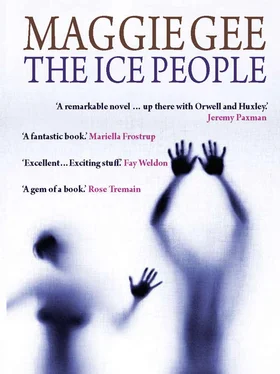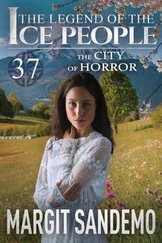I confided in Ash. He was shocked, sympathetic. ‘I thought you two got along all right,’ he said. It was as if his parents had let him down. He must have mentioned it to Riswan, because Riswan asked me to the club again.
So what if I went? Perhaps I’d learn something. Sarah didn’t care; had never cared, no more than she cared for Polly’s father …
Men, for Sarah, were just something to use. I found myself telling most of this to the bald and muscular men at the Gay Scientists. They laughed a lot, and were basically friendly. They liked me, I felt, they did not despise me, we were all men together, we could be free …
Richard and Nimit and Riswan and Timmy. Plump pale Billy, handsome Paul … Ian with his clique of bodybuilt clones. Too many new names for me to get right. Bristlescalped, smiling men in leather, welcoming me to a safe new dream.
And when we were tired of talking, or dancing, or working out in the fabulous gym, the machines were waiting, infinitely yielding. The net expanded through the rows of screens. Somewhere we could go that was always home. A lap, a space beyond time or pain.
I push the door open, cautiously. The cold is telling me it’s late. (I had a watch until last week, keeping it hidden under layers of shirts and the final semmit of greasy wool, till one of the boys saw me squinnying at it. I miss my watch, yet I still know the time, it’s as if it has been tattooed on my skin through all the years of trying to obey it.) Getting dark already, and I’ve hardly started.
Is something afoot among the boys? I catch them peering, muttering. It makes me feel as though time’s running out, and I must write it now or never, so it won’t be lost, all that different life, so bright, sometimes, and lucky, and sunny …
And the people. All the people I loved.
Luke as a boy, like a tall thin colt, a Palomino, pale and golden. Running down the corridor with slightly knock knees, ‘Daddy, Daddy!’ He sang like an angel. It was a weird gift, absolute and awesome, a voice like a celestial musical instrument, and no one could imagine where it had come from. It seemed unconnected to the child we knew, gawky, affectionate, impulsive, clumsy.
My mother and father, with their unreasonable pride in all our little family did. Sitting round the table with them at Christmas, eating one of Sarah’s flaming puddings.
Sarah. Despite all the bitterness, I mustn’t lose sight of how much I loved her. I had faults too. I was cruel. I teased her. I often forgot how fragile she was, under her driving, ambitious shell. My beautiful girl, with her small soft hands and her vulnerable, babyblind face in the mornings, before she put her contact lenses in.
Time cantered by. We were in our late thirties, forty, fortyone, my first white hair, and Luke was five, then six, then seven. Sarah came and went, and had other boyfriends. She grew thinner, more thoughtful, and her hair changed colour, though only someone who loved her would have noticed, a more vivid red to hide the grey.
Someone who loved her and sometimes disliked her.
She grew bitter against men, though not always against me. She had a life with women that I didn’t understand, didn’t want to know about, never asked. Sometimes she stayed away for days. And who looked after Luke, when she didn’t come home? Who was always there to make Luke’s breakfast?
She came and went, but she cared for my parents. I’ll never forget what she did for them.
Neither of them wanted the replacement parts that gave old people the nickname ‘bits’. When monitoring made it clear that Samuel needed a new liver, I tried to press the money upon them, and didn’t understand when they refused.
‘We’re not a lot of use to anyone,’ Samuel said. Milly nodded.
‘I know you never liked the terming programme, Saul …’ Even then, I didn’t want her to mention it. It had come as a sickening shock when I learned as a boy what she did at the Last Farewell Home. If she killed old people, she might kill me. ‘… but you young people can’t carry us all. We don’t want to live to be daft and helpless.’
‘Nonsense. You’re not daft. And how about your grandson? Luke adores you. Luke needs his grandparents.’
‘I’m tired,’ said Samuel. And he did look tired. He worked his jaw; it was stiff, skeletal. ‘It’s time to go, my son. Only fools think they can live forever.’
It made me feel guilty that they didn’t want to live; it must be because I hadn’t loved them enough. ‘Listen to me, Dad, please. If you take a new liver, Mum will take a heart … Think about her. Think about us.’
But Sarah dug her fingers in the small of my back. ‘That isn’t fair, they’ve always thought about us. I understand what you’re saying, Samuel. I’ll look after you, if you ever need me.’
‘You’re not old,’ I exploded, irritated at the way my father smiled at her. ‘You’re only ninety! You can’t give up.’
Ridiculous, now I think about it: that ninety wasn’t old to us. Now people die at forty or fifty, if they survive the cold that long.
And I am the Emperor of Old Age, at sixty. My bones pain me. Crumbling, sliding. Setting into a cage of claws, the flesh contorted by the bars. I suppose it’s arthritis, if it’s nothing worse. And chilblains, and footrot, and lice, and fleas — and toothache. That nerve, in the middle of the night. And my scalp crawls constantly. Worrying, tickling.
I hope my Sarah, no longer mine — I hope she isn’t enduring this. If she still survives, may she be Inside. In some last warm place, out of the wind.
My delicate Sarah, who so loved cleanliness. She cared for my parents without complaining, when my father shrank, and smelled, and was pitiful, and Milly’s circulation began to break down, as if she were giving up, little by little. Sarah took eight weeks off, which was risky, with screen work. She moved into their tiny house so they could stay at home to die, and although Sarah said it seemed endless to her, their dying was over in less than three months — they died two weeks apart, after a lifetime together. They stayed the course. And she stayed by their bedside. I did what I could, but it was so claustrophobic, the little overheated house, and I felt embarrassed by my parents’ bodies. The thinner they got, the more heat they needed … And women are so much better with nursing. Besides, I didn’t really understand they were dying — didn’t understand, couldn’t understand.
Nor the curious legacy Samuel left me, death in a bag, unthinkable, tempting. My father, that lawabiding man.
‘In case you need them. You’re my son, ’ he breathed, that harsh strange breathing he did at the end. ‘Under the bed. Be careful.’
I didn’t know what he was talking about. The green canvas bag was under their bed, and I made a halfhearted attempt to pull it out. It looked like something for golfing irons, but it was heavy, and I was in a hurry, I had just dropped by on my way to the airport. ‘I’m not sure I’d use them, Dad,’ I demurred. ‘You know, I’m so busy, and I’ve never played golf.’
His red eyes stared at me, unsmiling. ‘Guns,’ he said. ‘Good ones. You could use them.’ Each breath was an effort. ‘Anyone could.’
That brought me up short, but I only halfbelieved him, he was very ill, perhaps hallucinating. ‘What do you mean, guns? ’
‘You’re a good boy Saul, but God help you … Take the bag and lock it away. Times could get hard. After I’m gone.’
I thought I was humouring him. ‘Thanks, Dad.’
His lids flickered down, then he was wide awake. ‘Remember, be careful. Accidents. They were confiscated. In the line of duty. One day, I thought … Maybe one day …’
Читать дальше












